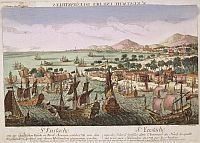
St. Eustatius 1781
On this day in 1776, Governor Johannes de Graaff of St. Eustatius returned the salute fired by the American brig Andrew Doria, which is considered to be the first international acknowledgment of the independence of the new republic of the United States. There is some disagreement over whether this was the “first salute.” An American schooner flying the Grand Union flag received a salute a month earlier in St. Croix. Nevertheless, St. Eustatius, or Statia, as it is commonly known, usually is given the credit by historians. Pulitzer Prize–winning historian Barbara Tuchman wrote, The First Salute: A View of the American Revolution in 1988.
Whether the salute was indeed intended as recognition of the young republic is open to question. The Andrew Doria fired an eleven gun salute on her arrival at Statia and received a nine gun salute in return. Technically, the Andrew Doria was a warship and should have received an eleven gun salute. A nine gun salute was appropriate for a merchant vessel. Governor de Graaff would later say that he was unaware of the newly adopted American colors and had ordered the Andrea Doria‘s salute returned out of normal courtesy.
If Statia received the credit for the first salute, it also suffered the consequences. Statia was a center for trade between the new republic and Europe, much to the displeasure of the British. In 1778, Lord Stormont claimed in Parliament that, “if Sint Eustatius had sunk into the sea three years before, the United Kingdom would already have dealt with George Washington“. The trade between Statia and the United States, in particular the sale of arms, was a primary reason for the Fourth Anglo-Dutch War.
In December of 1780, the British declared war on the Dutch Republic. In February of 1781, a fleet under the command of Admiral George Brydges Rodney arrived off Statia, carrying 3,000 troops under the command of under General John Vaughan. Governor de Graaff was taken by surprise, having not received news of the declaration of war. Rodney and Vaugh captured the rich store houses of Statia and the fleet of 130 merchantmen anchored in the road-stead.
Rodney stayed in Statia until July. Rather than appointing a prize master to account for and manage the captured goods, Rodney and Vaughan took over the jobs themselves. Rodney also rounded up the Jewish population of Statia, deported all the males to England and burned a synagogue, the only house of worship burned during the occupation.
Strangely enough, Rodney’s looting of Statia may have significantly contributed to Washington’s victory at the Battle of Yorktown, which ultimately lead to the American victory over the British and the end of the war. Rodney was not a wealthy man, a condition made worse by a fondness for gambling. While occupied in Statia, Rodney lost track of the French fleet commanded by Admiral François Joseph Paul compte de Grasse. He sent his second in command, Admiral Hood with part of the British fleet to pursue de Grasse while Rodney sailed with the rest of the fleet to Britain. Admiral de Grasse would go on to defeat the combined fleets of Admiral Hood and Graves at the Battle of the Capes, ensuring Washington’s victory at Yorktown.
British control of St. Eustatius only lasted ten months, and Rodney’s work to manage the prizes was in vain. Many of the goods he seized were captured on their way to Britain by a French squadron under Toussaint-Guillaume Picquet de la Motte. The island was captured by French forces in November 1781 who returned it to the Dutch in 1784. The Jews and other expelled merchants returned, commerce and trade resumed and the island’s population reached its all-time highest peak in 1790.
As a significant percentage of the merchandise seized at Statia belonged to English merchants, Rodney was later entangled in a series of costly lawsuits.
Rodney defended his action in Parliament against harsh criticism before returning with the fleet to the Caribbean. A letter ordering his recall was sent, but did not arrive until after Rodney’s victory at the Battle of the Saintes in April of 1782. The recall was forgotten and Rodney returned home a hero. Ironically, at the Battle of the Saintes, Rodney defeated Admiral de Grasse. If Rodney had defeated de Grasse the year before, rather than let him sail north to support Washington, American history might have been very different.

Dutch museums are full of works depicting naval victories over the British, eg https://plus.google.com/u/0/photos/117173072934335742431/albums/5896135944872491617/5896140336491771042?pid=5896140336491771042&oid=117173072934335742431
There are several more naval pictures in that album as well.
Interesting post.
Liz
Nice to read this from someone that is not actually living on the island. Always thought only Statians know about the first salute 🙂